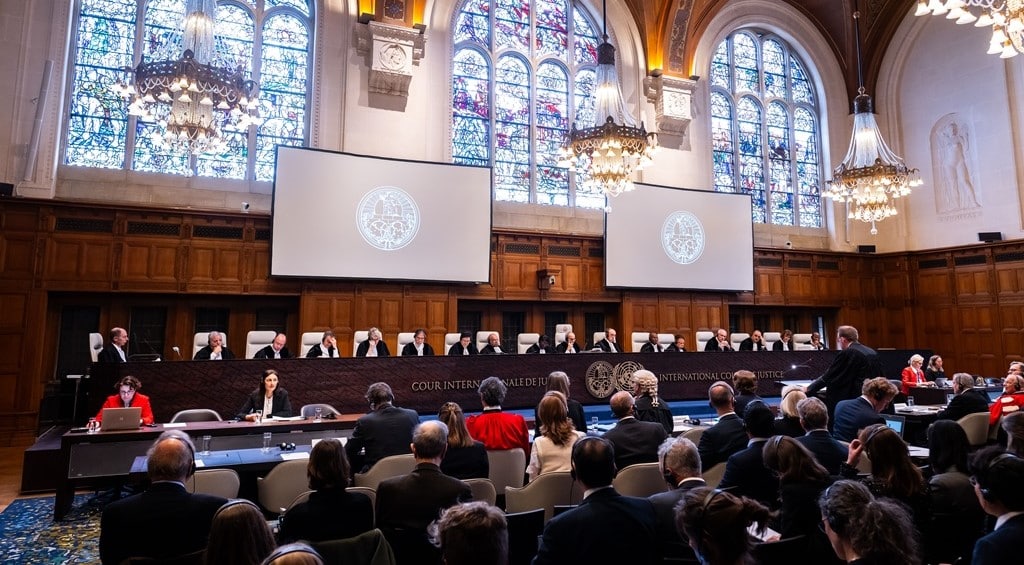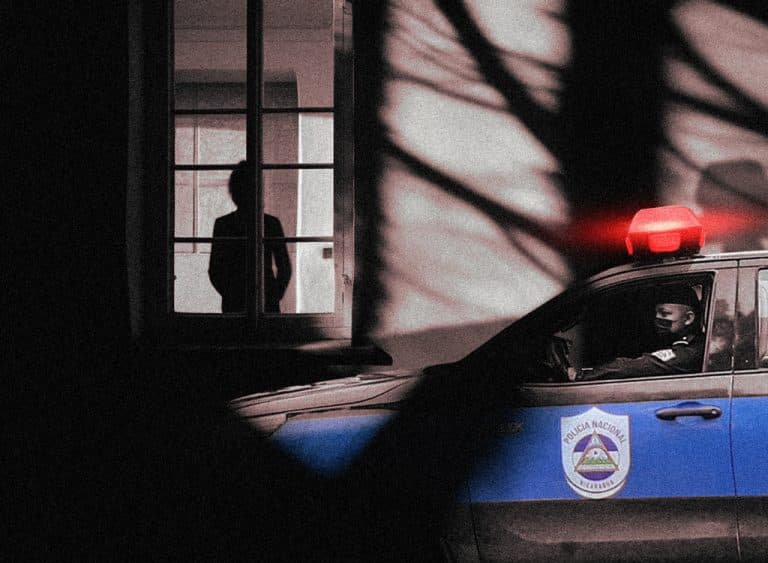28 de noviembre 2023

ICJ Rules Against Nicaragua's Request For Germany to Halt Arms Sales to Israel

PUBLICIDAD 1M
PUBLICIDAD 4D
PUBLICIDAD 5D
Relatives of exiles and former political prisoners denounce "visits" and threats from paramilitaries, other citizens, and police

Fotoarte: Confidencial
The national flag was once again waved jubilantly in the streets across Nicaragua to celebrate the triumph of Sheynnis Palacios as Miss Universe 2023. The expression of patriotism was a respite in a country that has lived for more than five years under a de facto police state, where those who wave the blue and white flag have been persecuted. Even cultural and solidarity expressions are being controlled by the dictatorship. The prohibition, on November 21, of the painting of a mural dedicated to the pageant winner on a street of Esteli is a reminder of the permanent surveillance under which Nicaraguans live, and that –despite the respite created by the historic conquest of a crown– repression is increasing every day.
For Graciela and her husband Arturo, leaving the house requires a whole "ritual" involving planning which streets to go down and making sure no one is watching them. Every time Graciela leaves or enters her house she feels that someone is following her. "You get a little paranoid," she admits.
Graciela knows she is being watched because she has seen people following her, and because close friends have told her. "There are different people doing it. Sometimes it is a well-known Ortega supporter, sometimes it is a Sandinista neighbor, sometimes it is a policeman in civilian clothes, or a man on a motorcycle," she says.
The couple says that since the couple joined the 2018 protests –and in particular, since they started organizing sit-ins and marches in southeastern Nicaragua–, they have received constant threats.
"The worst thing is that they started doing it [surveillance] discreetly, according to them, but now it's done brazenly. If we say something, many times they'll shout rude comments and threaten us," Arturo explains.
For Arturo, just over 40 years old, joining the protests got him fired from his job due to pressure from the regime. "I don't want to give too many details about the sector in which I worked, but from one day to the next they called my boss and told him he had to fire me, or else the whole place could get closed down in an instant," he recalls.
Arturo says that many friends and relatives have stopped visiting them because they fear that interacting with Graciela and him "means that they themselves will also be subject to surveillance."
Like the neighbors of the Citizen Power Councils (CPC) or Citizen Power Cabinets (CPG in Spanish) that spy on Graciela and Arturo, there are hundreds throughout the country, warns Danny Ramirez, executive secretary of the Inter-American Legal Assistance Center for Human Rights (CALIDH).
"The CPCs are territorial structures of the Sandinista Front party at the community and neighborhood level, and at the same time they are surveillance and intelligence units used not only to intimidate the population, but also to control everything that people do in their daily lives," Ramirez says.
CALIDH warns that the persecution and harassment against Nicaraguans who have participated in protests against the regime has not ceased, and in fact it has intensified in recent weeks, such that both police officers and CPC officials are now threatening people with "jail or exile."
"These people now have so much power within this framework of state terrorism and arbitrariness that they have taken on terrorizing the population. It is a mission they have had since 2018, to impose terror on people in the community," Ramirez claims.
Citing illegal imprisonments and prosecutions, stripping of nationality, as well as banishments, CPC members threaten people in the neighborhoods, warning them "that they will be thrown to the police."
"We have received reports of threats in which people are being told that their houses will be taken away, and this is happening especially in municipalities that are far from the cities," said CALIDH's executive secretary.
Teresa "crosses her fingers" every time she is going to post something on Facebook. She used to use her account on the social platform to share memes and news, but now she does so less and less frequently. So does her son who lives in Costa Rica.
"They have shouted threats at me from the street, telling me they're going to expel me from the country, that they're going to send me to my son," she says.
They have also shouted at her the warning that her son "better never think about setting foot in this city again because he will go straight to jail."
Since 2018 and continuing today, Teresa keeps having nightmares. First they were about her eldest son, who went into exile in 2019. Now they are about her two younger children who are in high school.
"This has caused me a lot of trauma, because every time patrol cars come and park outside the house, the lights shine in through the windows and you can hear them talking on the radios," says Teresa.
There have been times when the police have prevented her from leaving her house to go about her daily activities. She also avoids going out on days "that recall specific and historic days of protest."
"When my son went into exile I thought the surveillance would stop, but they haven't stopped harassing me, they still want to drive me crazy. But I have faith in God and that is my strength," says Teresa.
The dictatorship of Daniel Ortega and Rosario Murillo is currently holding more than 130 political prisoners in Nicaragua, despite the release and banishment of 222 political prisoners in February and twelve priests who were prisoners of conscience in October, as reported by CONFIDENCIAL.
Among these 130 political prisoners, there are some sixty people who remain under de facto "house arrest" or "city confinement," following a raid carried out in May by the Police in coordination with the Public Prosecutor's Office and the Judiciary. They are required to sign in daily, weekly or biweekly at assigned police stations,
This same pattern of persecution was repeated in September and October, but this time against parishioners of the Catholic Church, mainly in the north of the country, where repression has been concentrated in the dioceses of Matagalpa and Estelí.
The police summoned a dozen citizens to inform them that they are being investigated and that they are under "city confinement." However, human rights organizations claim there is significant underreporting of detentions because many fear reprisals if they make public denunciations. The number of political prisoners, they estimate, could be as high as 200.
"I've received threats of house arrest or city confinement, but never formally. Police officers and CPCs make these threats on days when they think people might come out and protest," says Teresa.
Sometimes the surveillance lasts a week. Sometimes just one day. Teresa has said that sometimes they don't even let her go out to the market to buy food. "The message they want to give us is that they are always watching us, that they don't forget us," she says.
Surveillance has been part of Flor's life since 2018. Her house in Masaya has been stoned at midnight and she has woken up to find graffiti painted on the facade. The last time they wrote: "PLOMO [abbreviation for "Free country or death"] we are watching you."
Flor gave food to the demonstrators who organized roadblocks during the peak months of citizen protests against the regime. "Since then I have been being watched by several neighbors who are part of the CPCs."
Although Flor always had cordial relations with most of her neighbors, she now prefers to avoid them because she has received "aggressions and threats" from some of them. She suspects they were the ones who denounced her husband, who was imprisoned for several months.
"It's hard to live close to people who have so much hatred and resentment against you. My husband and my eldest son went into exile because they couldn't find work, and for security reasons," she confesses.
Now Flor lives only with her youngest son and her mother-in-law. "There have been times when someone who was also in the protests comes to see me, and within minutes a patrol car arrives on the street," she says. "It's constant spying," she laments. However, Flor is convinced that "We are not criminals, we are just trying to get on with our lives. We earn our money honestly."
This article was published in Spanish in Confidencial and by our staff. To get the most relevant news from our English coverage delivered straight to your inbox, subscribe to The Dispatch.
PUBLICIDAD 3M
Confidencial es un diario digital nicaragüense, de formato multimedia, fundado por Carlos F. Chamorro en junio de 1996. Inició como un semanario impreso y hoy es un medio de referencia regional con información, análisis, entrevistas, perfiles, reportajes e investigaciones sobre Nicaragua, informando desde el exilio por la persecución política de la dictadura de Daniel Ortega y Rosario Murillo.
PUBLICIDAD 3D